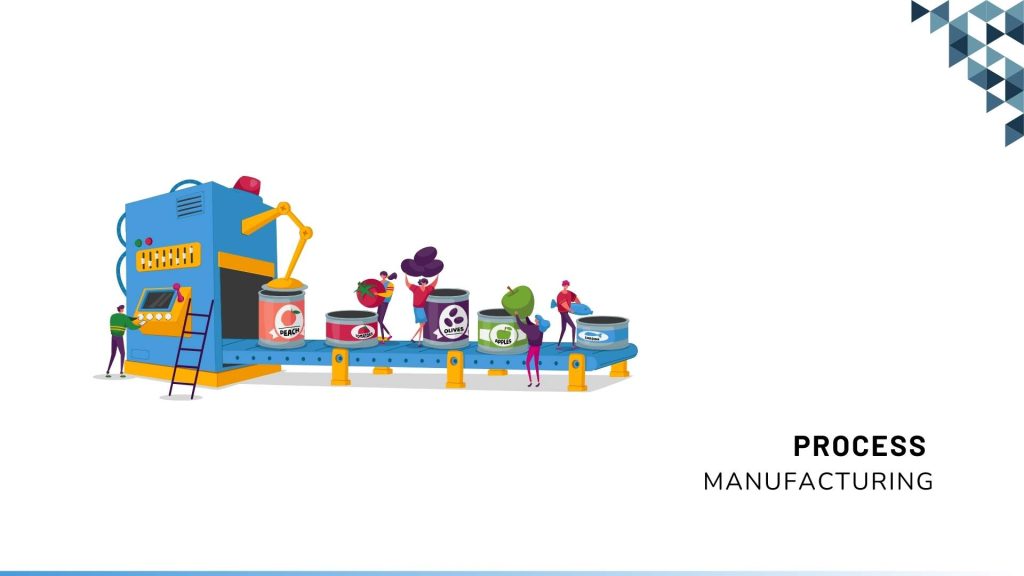In the dynamic realm of process manufacturing, where precision, compliance, and efficiency are paramount, selecting an ERP system becomes a pivotal decision. A robust ERP tailored for process manufacturing streamlines operations enhances traceability, ensures compliance, and fosters innovation. But what are the key features that truly define a competent process manufacturing ERP? Let’s delve deeper into these essentials.
A Quick Look at What is Process Manufacturing?
Process manufacturing revolves around the production of goods through formulas or recipes. Unlike discrete manufacturing, where distinct units are assembled, process manufacturing combines ingredients or components to create finished goods. Industries like pharmaceuticals, food and beverages, chemicals, and cosmetics rely heavily on process manufacturing to produce high-quality, consistent products.
Discrete Vs. Process Manufacturing:
Discrete manufacturing implicates the production of different items, such as automobiles, smartphones, or furniture. Each product is unique and can be counted as separate units. On the other hand, process manufacturing creates goods produced in bulk through formulas or recipes, like chemicals, food, or beverages. Here, items are made through continuous processes and cannot be easily differentiated once produced.
For Discrete Manufacturing:
Discrete manufacturing focuses on producing individual, identifiable products. Take the automotive industry, where each car has unique identification numbers and customizable features. This method involves assembly lines and specific part integration to create distinct items.
For Process Manufacturing:
In contrast, process manufacturing revolves around constant production flows. For instance, in the food industry, ingredients are mixed, processed, and packaged in large quantities, making it challenging to distinguish one unit from another due to the homogeneity of the final products.
Benefits of ERP Modules:
Real-time Data Visibility: ERP modules offer real-time insights into various aspects of operations, from inventory levels to production statuses. This visibility enables quick decision-making, allowing businesses to respond promptly to changes in demand or supply chain disruptions.
Scalable Batch Manufacturing: With ERP modules, batch manufacturing becomes more flexible and scalable. Businesses can adjust batch sizes efficiently based on demand fluctuations while maintaining quality standards. This adaptability optimizes resources and reduces wastage.
Industry-Specific Compliance: ERP modules often have features tailored to meet industry-specific regulations and compliance standards. It ensures that businesses adhere to necessary guidelines effortlessly, minimizing the risk of penalties or operational disruptions.
What Role Does ERP Software Play in Process Manufacturing?
An ERP system acts as the nerve center, orchestrating various facets of process manufacturing. It consolidates data, facilitates inventory management, regulates production schedules, and ensures compliance with industry regulations. Moreover, it empowers decision-makers with real-time insights, enabling agile responses to market demands.
Top Features in a Process Manufacturing ERP:
Supports Different Measurement Units:
Process manufacturing often involves diverse units of measurement. An ERP must seamlessly handle this variability to ensure accurate calculations and inventory management. A manufacturing ERP should adeptly convert and manage measurement units such as kilograms, liters, gallons, etc. This functionality ensures precision in inventory control, production planning, and material sourcing.
Ability to Track and Trace Lots:
Traceability is a paramount in process manufacturing, especially in industries like pharmaceuticals and food industries. An ERP system should enable meticulous tracking of raw materials, finished products, and intermediates throughout the production and distribution chain. Manufacturers can swiftly identify and rectify issues by tracing lots, ensuring product safety and regulatory compliance.
Cost Tracking:
Precise cost tracking is essential for profitability in manufacturing processes. An ERP should provide a comprehensive cost analysis, including material, labor, overheads, and other expenses incurred during production. This feature aids in accurate pricing, budgeting, and identifying cost-saving opportunities.
Adaptability and Customization to New Formulas/Recipes:
Process manufacturing involves constant innovation and the introduction of new formulas or recipes. An ERP system should allow seamless integration of these changes without disrupting ongoing operations. The ability to swiftly incorporate new formulas ensures agility and keeps the production line adaptable to market demands.
Management of Co-Products and By-Products:
Many process manufacturing operations yield co-products or by-products. An ERP should efficiently manage these additional outputs, ensuring proper allocation, pricing, and utilization. Effective management of co-products and by-products optimizes resources and minimizes waste.
Supply Chain Optimization:
An ERP system should integrate supply chain management, enabling efficient procurement, inventory control, and supplier collaboration. Optimizing the supply chain fosters just-in-time production, reduces lead times, and minimizes inventory holding costs.
Tracking of Shelf Life:
Products in manufacturing processes often need longer shelf lives. An ERP should incorporate features to monitor ensuring distribution to prevent wastage due to expired inventory. This capability is crucial for industries dealing with perishable goods.
Agile Production Support:
Process manufacturing environments require flexibility in production scheduling and resource allocation. An ERP should facilitate dynamic scheduling, allowing swift adjustments to accommodate changing demands or unforeseen circumstances. Agile production support enhances responsiveness and efficiency in the manufacturing process.
Safety of Trade Secrets:
The protection of intellectual property and formulas is critical in manufacturing processes. An ERP should have robust security measures to safeguard sensitive information from unauthorized access or data breaches. Ensuring the confidentiality of trade secrets maintains a competitive edge in the market.
Quality Management and Market Compliance:
An ERP system must embed quality management functionalities to uphold product standards, regulatory compliance, and certifications. Compliance with industry-specific regulations and standards is vital for maintaining market credibility and consumer trust.
How can Acumatica enhance Process Manufacturing Businesses
Acumatica, with its comprehensive suite of cloud-based ERP solutions, stands as a transformative tool for manufacturing companies seeking enhanced efficiency and agility. Its customizable modules empower these companies by providing real-time insights into operations, streamlining complex processes, and enabling seamless coordination across production, inventory, and distribution channels.
Acumatica’s flexibility allows manufacturing firms to adapt swiftly to changing market demands, scale their operations efficiently, and ensure compliance with industry regulations. Ultimately, Acumatica serves as a catalyst for manufacturing companies, fostering innovation, optimizing resource utilization, and driving sustained growth in a competitive

Vijay comes with a vast experience in ERP and enterprise solutions space with about 20 years of experience in various packaged application like Acumatica, SAP, Orion, Salesforce.com, SugarCRM and, SalesLogix.

